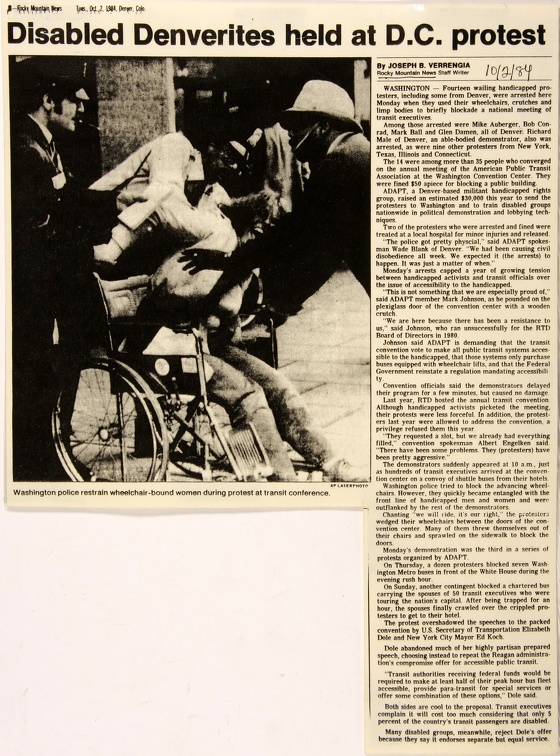- LanguageAfrikaans Argentina AzÉrbaycanca
á¥áá áá£áá Äesky Ãslenska
áá¶áá¶ááááá à¤à¥à¤à¤à¤£à¥ বাà¦à¦²à¦¾
தமிழ௠à²à²¨à³à²¨à²¡ ภาษาà¹à¸à¸¢
ä¸æ (ç¹é«) ä¸æ (é¦æ¸¯) Bahasa Indonesia
Brasil Brezhoneg CatalÃ
ç®ä½ä¸æ Dansk Deutsch
Dhivehi English English
English Español Esperanto
Estonian Finnish Français
Français Gaeilge Galego
Hrvatski Italiano Îλληνικά
íêµì´ LatvieÅ¡u Lëtzebuergesch
Lietuviu Magyar Malay
Nederlands Norwegian nynorsk Norwegian
Polski Português RomânÄ
Slovenšcina Slovensky Srpski
Svenska Türkçe Tiếng Viá»t
Ù¾Ø§Ø±Ø³Û æ¥æ¬èª ÐÑлгаÑÑки
ÐакедонÑки Ðонгол Ð ÑÑÑкий
СÑпÑки УкÑаÑнÑÑка ×¢×ר×ת
اÙعربÙØ© اÙعربÙØ©
Home / އަލްބަމްތައް / ޓެގުތައް Denver + blocking a bus
+ blocking a bus + training
+ training + Illinois
+ Illinois 1
1

 ADAPT (156)
ADAPT (156)
Rocky Mountain News Tues. Oct. 2, 1984 Denver, Colo. PHOTO (AP LASER PHOTO): A protester in a manual wheelchair and a puffy coat (Renata Conrad), screams as police force her arms behind her back. One uniformed officer stands behind her forcing her forward. One stands in front, his arms stretched in front. The third stands watching with his notebook in his hand and his pen or maybe a cigarette in his mouth. Caption reads: Washington police restrain wheelchair-bound women during protest at transit conference. [Headline] Disabled Denverites held at D.C. protest By JOSEPH B. VERRENGIA Rocky Mountain News Staff Writer WASHINGTON — Fourteen wailing handicapped protesters, including some from Denver, were arrested here Monday when they used their wheelchairs, crutches and limp bodies to briefly blockade a national meeting of transit executives. Among those arrested were Mike Auberger, Bob Conrad, Mark Ball and Glen Damen, all of Denver. Richard Male of Denver, an able-bodied demonstrator, also was arrested, as were nine other protesters from New York, Texas, Illinois and Connecticut. The 14 were among more than 35 people who converged on the annual meeting of the American Public Transit Association at the Washington Convention Center. They were fined $50 apiece for blocking a public building. ADAPT, a Denver-based militant handicapped rights group, raised an estimated $30,000 this year to send the protesters to Washington and to train disabled groups nationwide in political demonstration and lobbying techniques. Two of the protesters who were arrested and fined were treated at a local hospital for minor injuries and released. "The police got pretty physical,“ said ADAPT spokesman Wade Blank of Denver. "We had been causing civil disobedience all week. We expected it (the arrests) to happen. It was just a matter of when." Monday's arrests capped a year of growing tension between handicapped activists and transit officials over the issue of accessibility to the handicapped. “This is not something that we are especially proud of,"said ADAPT member Mark Johnson, as he pounded on the plexiglass door of the convention center with a wooden crutch. "We are here because there has been a resistance to us," said Johnson, who ran unsuccessfully for the RTD Board of Directors in 1980. Johnson said ADAPT is demanding that the transit convention vote to make all public transit systems accessible to the handicapped, that those systems only purchase buses equipped with wheelchair lifts, and that the Federal Government reinstate a regulation mandating accessibility. Convention officials said the demonstrators delayed their program for a few minutes, but caused no damage. Last year, RTD hosted the annual transit convention. Although handicapped activists picketed the meeting, their protests were less forceful. In addition, the protesters last year were allowed to address the convention, a privilege refused them this year. "They requested a slot, but we already had everything filled," convention spokesman Albert Engelken said. "There have been some problems. They (protesters) have been pretty aggressive." The demonstrators suddenly appeared at 10 a.m, just as hundreds of transit executives arrived at the convention center on a convoy of shuttle buses from their hotels. Washington police tried to block the advancing wheelchairs. However, they quickly became entangled with the front line of handicapped men and women and were outflanked by the rest of the demonstrators. Chanting "we will ride. it's our right," the protesters wedged their wheelchairs between the doors of the convention center. Many of them threw themselves out of their chairs and sprawled on the sidewalk to block the doors. Monday's demonstration was the third in a series of protests organized by ADAPT. On Thursday, a dozen protesters blocked seven Washington Metro buses in front of the White House during the evening rush hour. On Sunday, another contingent blocked a chartered bus carrying the spouses of 50 transit executives who were touring the nation's capital. After being trapped for an hour, the spouses finally crawled over the crippled protesters to get to their hotel. The protest overshadowed the speeches to the packed convention by U.S. Secretary of Transportation Elizabeth Dole and New York City Mayor Ed Koch. Dole abandoned much of her highly partisan prepared speech, choosing instead to repeat the Reagan administration's compromise offer for accessible public transit. "Transit authorities receiving federal funds would be required to make at least half of their peak hour bus fleet accessible, provide para-transit for special services or offer some combination of these options," Dole said. Both sides are cool to the proposal. Transit executives complain it will cost too much considering that only 5 percent of the country's transit passengers are disabled. Many disabled groups, meanwhile, reject Dole's offer because they say it endorses separate but equal service.